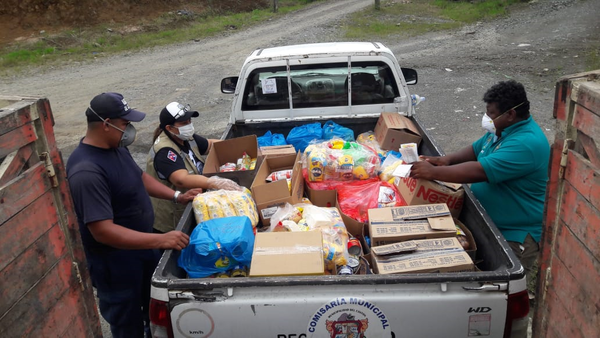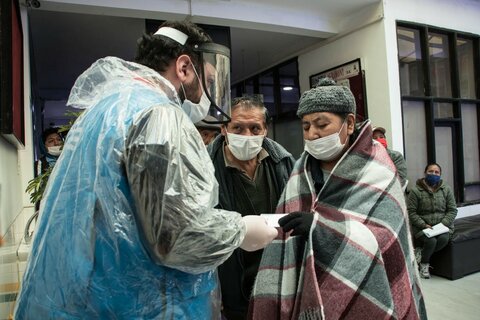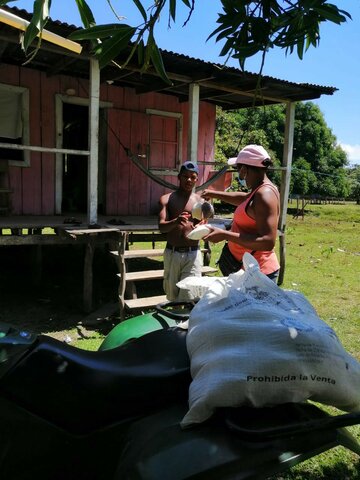Coronavirus puts 14 million people at risk of missing meals in Latin America and the Caribbean

Help people not to miss meals because of coronavirus. Take part in WFP's #MissingThisMeal campaign
As South America becomes "a new ‘epicentre" of the COVID-19 pandemic according to the World Health Organization, measures taken to contain its spread look set to take a devastating toll on the broader Latin America and Caribbean region.
The World Food Programme (WFP) estimates that the number of people experiencing severe food insecurity could quadruple from the current 3.4 million to 13.7 million in 2020, based on analysis in countries where it has a presence.


WFP runs projects in Bolivia, Colombia, Cuba, the Dominican Republic, Ecuador, El Salvador, Guatemala, Haiti, Honduras, Nicaragua, Peru and small island developing states in the Caribbean.
The forecasted contraction of the regional economy — estimated by the Economic Commission for Latin America and the Caribbean at -5.3 percent, the biggest drop yet in the region's history — will likely hit hardest those who rely on daily earnings from jobs in the informal sector. In Bolivia, that is up to 60 percent of the population. In a recent WFP survey in nine countries, 69 percent of the 41,000 respondents said they had seen a reduction in their incomes due to the pandemic — with women particularly affected.
Impossible choices: Bolivia's coronavirus conundrum

"We try to consume less food and electricity. We try to buy fruit that is in season, so we reduce consumption of other foods and stretch our money a little further," said one survey participant. Seven out of 10 respondents said they were worried about having enough food. Alarmingly, 17 percent of respondents in urban areas reported having only one meal per day, or none at all.
Risk to migrants may almost double
Areas of particular concern include Haiti, where the number of people in severe food insecurity could rise from 700,000 to 1.6 million, and the Dry Corridor of Central America, where it could increase from more than 1.6 million to close to 3 million. The looming hurricane season in the Caribbean poses an additional risk.

In Colombia, Ecuador and Peru, COVID-19 could increase severe food insecurity among extremely vulnerable Venezuelan migrants from 540,000 to more than 1 million. The story of Dayana exemplifies their plight. A hairdresser who left everything behind due to the crisis in her country, she settled down on the outskirts of the Colombian capital, Bogotá, with her husband and three children. After the coronavirus outbreak, she lost her job at a recycling plant and was left to rely on humanitarian assistance. Dayana is one of the 5,000 Colombians and Venezuelans who received WFP take-home food baskets to help them through this difficult time.
WFP has also been distributing food rations and cash or vouchers — often in electronic form to reduce the risk of contagion — in Bolivia, Ecuador and El Salvador. In Colombia and Ecuador, WFP is managing call centres and Whatsapp channels to provide information and ensure the assistance reaches those who need it.
Missing school, missing meals
In several countries, COVID-related closures mean children missing out on the nutritious lunches they used to receive at school — the only proper meals many of them could count on.
"The food we provided at school was very valuable for many families," says Professor Marco Tulio Salgado from Catacama, a municipality in Olancho department, Honduras. "There are many communities here where food is already scarce at normal times, let alone during an emergency situation like this." To ensure children and their families continued to benefit, 1,500 teachers in the department joined forces with local school feeding committees — made up of parents — to prepare food rations and ensure their distribution according to strict safety and hygiene protocols.

Elsewhere in the country, teachers opted for home deliveries. This would prevent people from congregating around the schools to pick up their rations, and allow teachers to visit their pupils. "I could see how each of my 48 pupils was doing — and how happy they were at receiving the food," says Dorla Haylock, a kindergarten teacher in the remote community of Kaukira, Gracias a Dios department. Dorla went on a door-to-door delivery round on an all-terrain quad. "It was sad to see the children going around looking for green mangoes — often the only thing they would eat in a day," she says.
COVID-19: Teachers in Honduras get on their bikes to deliver school meals

Protection of vulnerable groups must be expanded
The magnitude of this health crisis and its socioeconomic impact is such that it will be impossible for humanitarian organizations to cover all the emerging needs.
"National programmes designed to reduce poverty can play a key role in responding to this emergency at scale," says WFP's Regional Director Miguel Barreto. "In the past years, we have worked with governments across the region to strengthen their social-protection schemes and make them responsive to shocks, such as climate-related disasters."

Across the region, over 200 million people — or 35 percent of the overall population — are covered by some form of social protection to shield them from major shocks. Programmes will need to be expanded to cover the additional needs of current beneficiaries, and to cater for new groups.
The Dominican Republic provides an example of how this could work. In response to the emergency, the almost 900,000 families who already benefited from assistance are receiving an additional US$92.3 per month — with a further increase for households headed by elderly people. At the same time, another 700,000 new households have been included in the scheme, including 70,000 families of informal workers who lost their income. All new beneficiaries receive a monthly transfer of US$92.3 under the government's ‘Stay at home' initiative.
"Expanding the reach of social-protection mechanisms at this time of crisis will make a difference. It will allow people who live hand-to-mouth to meet their basic needs while keeping safe at home," Barreto explains. "WFP stands ready to help governments in ensuring their social-protection nets are up to the challenge posed by COVID-19."
